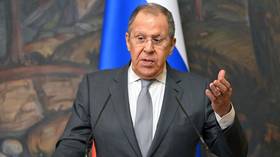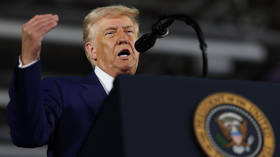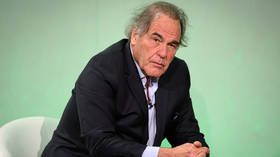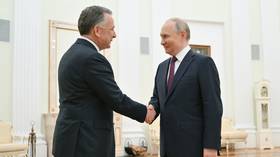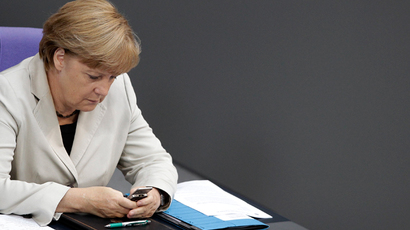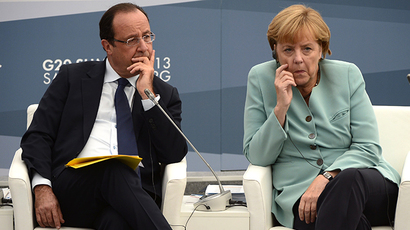German Chancellor Merkel on NSA spy list since 2002 – reports
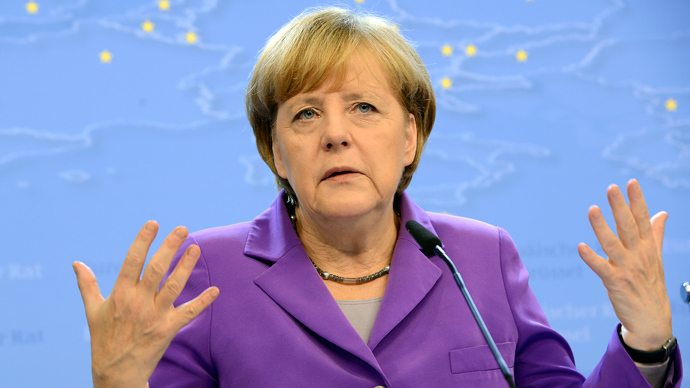
The German Chancellor’s mobile phone has been on an NSA target list since 2002 and was code-named “GE Chancellor Merkel”, according to Der Spiegel. The paper also reports that President Obama assured Merkel that he did not know her phone was tapped.
The monitoring operation was still in force even a few weeks
before Obama's visit to Berlin in June 2013.
In the NSA's Special Collection Service (SCS) document cited by
the magazine, the agency said it had a "not legally registered
spying branch" in the US embassy in Berlin. It also warned
that its exposure would lead to "grave damage for the
relations of the United States to another government".
Using the spying branch, NSA and CIA staff were tapping
communications in Berlin's government district with high-tech
surveillance.
The magazine says that according to a secret document from 2010,
such branches existed in about 80 locations around the world,
including Paris, Madrid, Rome, Prague, Geneva and Frankfurt.
However, in is unclear, Der Spiegel reports, if the SCS obtained recorded conversations or just connection data.
President Obama, however, told Merkel that he was not aware that
her phone was bugged, if he had known, he would have immediately
stopped it, Der Spiegel reports as it also disclosed the recent
conversation between the two.
The German newspaper cites the Chancellor's office, which said
that during Wednesday call Obama expressed his deep regret and
apologized to the Chancellor.
Earlier, Barack Obama assured Merkel that his country was not
monitoring her communications, but failed to confirm or deny the
tapping took place in the past.
Speaking to her German counterpart, Susan E. Rice, the
President’s national security adviser, also insisted that Obama
did not know about the monitoring of Merkel’s phone, and said it
was not currently happening. However, she also failed to deny it
happened in the past.
Angela Merkel called President Obama over the German government's
suspicions the US could have tapped her mobile phone on
Wednesday.
Following the call, German government spokesman Georg Streiter
stated that Merkel had made clear to Obama that if the
information proved trued it would be “completely unacceptable”
and represent a “grave breach of trust”.
A few days earlier, the US President had to convince his French
colleague of the same issues.
The Le Monde newspaper reported earlier this week that the NSA
spied on the agency records of millions of phone calls of top
French politicians and business people. Later The Guardian
revealed citing former NSA contractor Edward Snowden that the
leadership of 35 nations was spied on; the list of countries
however did not follow.
In response to allegations, Obama promised that the US secret
service would revise its methods of working in order to both
provide the security of citizens and not to interfere with their
privacy.

Germany will send heads of its foreign and domestic intelligence
agencies to Washington to hold talks with the White House and the
National Security Agency in order to push forward" an
investigation into allegations the US spied on its leader.”
"What exactly is going to be regulated, how and in what form
it will be negotiated and by whom, I cannot tell you right
now," German government spokesman Georg Streiter told
reporters.
German media citing sources close to the intelligence service
reported on Saturday that the delegation will include top
officials from the German secret service.
Earlier, Germany and France said they want “a no-spy deal”
with the US to be signed by the end of the year.
The Foreign Policy reported on Saturday that 21 one countries are
now participating in talks over a draft UN General Resolution
aimed at holding back US government surveillance.
EU leaders say their relations with the US have been undermined
by reports of NSA spying on European leaders and ordinary
citizens.
A partnership with America should be built on respect and trust,
they said in a joint statement on Friday.
"[The leaders] stressed that intelligence gathering is a vital
element in the fight against terrorism,” the BBC cites the
statement as reading. “A lack of trust could prejudice the
necessary cooperation in the field of intelligence gathering."
The European Parliament recently voted for the suspension of US
access to the global financial database held by a Belgian company
because of concerns that the US is snooping on the database for
financial gain rather than just to combat terrorism.
However, anti-war activist Richard Becker doubted President Obama
did not know the German Chancellor’s phone was bugged.
“These kinds of assertions are comical,” he told RT.
“It shows that the US’ relationship with other countries is
based on its notion of its “American exceptionalism."
There is in fact an American exceptionalism – no other country
in the world spies on everybody else and all of the countries and
feels free to intervene in all other countries,” he said.
Becker says the spying scandal shows “the nature of the
relationships” between the US and other states.
“Even among the allies they are in contention and competition
among each other and not to mention the kind of relationship that
is carried out against those countries that the US considers its
enemies,” he said.





